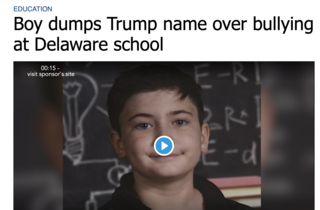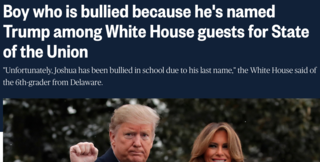Bullying
What the Joshua Trump Saga Can Teach Us About Antibullyism
We will never get rid of bullying because we don't want to
Posted February 14, 2019
The reason the anti-bullying movement is so popular is the same reason it is failing so dismally: everyone thinks the bully is somebody else.
There is a good chance you have heard of Joshua Trump. He may very well have become the world’s most famous child victim of bullying thanks to sharing our President’s last name. Melania Trump, who has made the campaign against bullying (or antibullyism, which is a more accurate and concise term for this movement) her own mission as First Lady, invited Joshua to attend her husband's recent State of the Union (SOTU) address.
I call the events surrounding Joshua a saga because he has been the subject of no less than three stages of viral news stories thus far, and perhaps there will be more, as Melania Trump may be making him the poster boy for her Be Best anti-bullying campaign. She is hoping to succeed where her predecessors, the Obamas, who also championed antibullyism, have failed.

The world has been combatting bullying intensively for twenty years now, since the Columbine massacre of 1999. The world has been losing, as bullying is considered a growing epidemic and child suicides, often a response of despair in the face of ongoing bullying, have been increasing during this period. The goal of anti-bullying efforts, including posting news stories about the suffering of bullied children such as Joshua Trump, is to raise awareness of bullying so that society will finally determine to take action to make it stop. However, if such efforts were successful, the problem would be history by now.
If anything, the events surrounding Joshua Trump should teach us that we need to stop expecting children to stop engaging in bullying behavior.
It would be great if slogans could spur everyone to become nice. Would that it were so simple. Scientists who study human nature, as well as wise people throughout history, know very well that the real reason we don’t get rid of nasty behavior towards people is that we don't want to. We enjoy it too much. We just don’t like it when people do it to us, but we want to be free to do it to them. We also want our news and entertainment media to give us plenty of people-bashing, especially of people we don't like.
Jonathan Haidt has become one of the world’s most influential psychologists, and rightfully so. He has written excellent books that delve into the truth of human nature. His first book, The Happiness Hypothesis, has an entire chapter titled The Faults of Others, dedicated to human hypocrisy. Mistakes Were Made (But Not by Me): Why We Justify Foolish Beliefs, Bad Decisions, and Hurtful Acts, by psychologists Carol Tavris and Elliot Aaronson, is a book totally dedicated to our hypocrisy. The Joy of Pain: Schadenfreude and the Dark Side of Human Nature, by psychologist Richard Smith, is an important work exposing our illicit enjoyment of others’ misery. Yes, indeed, “The bullies are us.” And there is nothing new about human hypocrisy. The most frequent insult that Jesus hurled at people is hypocrite. He is famous for recommending that we be more concerned with removing the plank from our own eye than the speck from the other’s eye.
Act One
Joshua Trump first made the news when his mother went public with the story of his misery at the hands of schoolmates who were picking on him because of his last name. Joshua wanted the school to change his last name in order to end the bullying.
Antibullyism has become a staple of children's education, and we can be reasonably certain that the kids tormenting Joshua had been taught that it is wrong to ridicule people because it can scar them forever. That was obviously not sufficient to prevent them from doing it to Joshua.
But was Joshua being “nice”? Being so ashamed of the Trump name that he wants to get rid of it is an insult to our President. Had he thought well of the President, he would have responded with pride rather than getting upset when kids made fun of his name, and that would likely have prevented him from becoming a victim of relentless bullying. Nor was he being nice to his ancestors by wanting to change his last name. Of course he is only a kid. He probably lacks in-depth understanding of why people are antagonistic to President Trump, and he doesn’t realize that his behavior is insulting. He only is aware of wanting kids to stop tormenting him because of his name.
And how about the news media that carried the story of Joshua being bullied, sympathizing with his misery and his desire to abandon the Trump name? Was their sympathy pure? Hardly. It was a great opportunity to bash Trump, showing how even a young, innocent boy is suffering because he was elected President. With the possible exception of Fox News and some other right-wing news outlets, the media have a field day ridiculing Donald. And it’s not just the news media, but the entertainment media as well. President Trump is the best thing that ever happened to Saturday Night Live.
And why do the media feel so comfortable ridiculing and attacking our President?
The main reason is that we want them to do it. All of us who despise Donald Trump are thrilled when the media bash him. Any reporter who dares to write something positive about Trump is bound to face the wrath of slews of readers.
Another reason is that Trump, too, takes frequent pleasure in ridiculing and attacking people, so the media feel justified doing those things to him. Donald, for his part, feels justified being nasty to others because he sees them as the bad guys. Everyone thinks the bad guy is the other person and therefore fair game.
Act Two
The second chapter in the Joshua Trump saga was his being invited by the Trumps to the SOTU address.

The Joshua Trump story was in the order of a divinely served-on-a-silver-platter opportunity for Melania to advance her antibullyism mission while turning the negative story into a positive one.
She had previously complained to the media about possibly being the world’s most bullied person. Like Joshua, she, too, had discovered the human proclivity for nastiness. But were the reporters sympathetic to her plight? Many further ridiculed her for suggesting that she was a serious victim of bullying. But they felt justified because Melania, after all, is the partner of our Bully-in-Chief and hadn’t begun her antibullyism campaign at home.
But Joshua, being a mere child with no relation to the President, was a figure truly deserving of public sympathy. What could be more advantageous for Melania’s anti-bullying campaign than making Joshua – another person suffering for having the Trump name – a poster boy for the Trump anti-bullying initiative? So they gave him a privilege often reserved for heroes – a ticket to the SOTU.
This tactic certainly had overtly good intentions. One intention is to promote antibullyism. A second is to relieve Joshua’s suffering by putting him in the spotlight. This is a common move by celebrities when stories of bullied children go viral. They figure that inviting these children to a special event, like a major league ball game or a rock concert, and inviting the press to give witness, will boost their self-esteem so high that they will become immune to taunts. And they expect that the fifteen-minutes-of-fame will cause the victims' schoolmates to have such respect for them that their desire to make fun of them will fizzle away.
But while the objectives seem noble, these celebrities, including Melania Trump, also have a personal stake in public displays of favor for bullied kids. Antibullyism is the world’s most popular social cause, and celebrities gain brownie points when portrayed in the news as taking concrete action to rescue bullied kids. So while it is questionable whether the celebrity's limelight actually puts an end the bullying for the victimized child, it unquestionably enhances the celebrity’s reputation.
And the reporters – many of whom freely engage in Trump-bashing – must also feel proud of themselves for publicizing these stories of celebrities championing bullying victims.
By the way, the biker community, which has earned a stereotype of beer-swigging anti-social bullies, has also taken advantage of bullied kids to boost its image. When a story of a child victim goes viral, Bikers Against Bullies sends a posse of riders to accompany the kid to school while the media eagerly cover their acts of valor.
Acts of altruism are not always totally pure. Who among us does not derive pleasure from virtue signaling?
Act Three
Alas, the heralded invitation to SOTU, intended to help Joshua and the First Couple, turned out to be something of a disaster: Joshua fell asleep. And who could blame him. How many eleven-year-olds are interested in political speeches? Sports events and concerts, sure, but SOTU? Plus, he was probably exhausted by all the preparations and excitement for the trip. Even adults could not be faulted for falling asleep under such circumstances.

And what did the news media do? They disseminated photos of the sleeping Joshua for the world to see. Did they consider that this might make his bullying problem worse? When he goes back to school, will kids congratulate him for his coveted Presidential invitation or laugh at him for falling asleep?

And were all the reporters saintly? Many used the incident to attack President Trump, highlighting how boring his speech was, as though an exhausted young boy is supposed to be thrilled by the SOTU address. They also used it to brand Joshua a “symbol of the resistance,” as though he purposely went to sleep as a political statement against the President. Joshua only wants to be left alone by other kids. But mature adults, who are supposed to be models for our children, take advantage of Joshua to promote their own anti-Trump sentiments. How nice!
Act Four?
Will there be a fourth act to the Joshua Trump bullying saga, or have we heard the last of him? Time will tell.
Meanwhile, one conclusion we can definitely draw at this point is that it is absurd to expect children to all become saintly when we adults enjoy nastiness while justifying ourselves to avoid cognitive dissonance.
What Should Joshua Do?
Everyone has their agendas, including me. One is to expose the hypocrisy of antibullyism so that we stop wasting time, money and effort on futile campaigns that encourage everyone to become nice. Condemning bullying will never make us give it up because we don’t want to. We enjoy insulting the President (and other people, of course), and we enjoy our news and entertainment media doing so as well. And we rationalize the meanness because they are the bad guys who deserve it.
My ultimate agenda, though, is to stop people from suffering from bullying. It is a truly serious problem and people deserve help.
Nastiness and self-interest are here to stay. They are our basic nature. But what we can do is teach people to nip nastiness in the bud so that they don’t become perpetual victims. Following the initial news story of Josh’s bullying, I wrote an article of advice for kids named Trump, because Joshua is undoubtedly not the only Trump in his situation. Please pass it on to those who could benefit.
And I want to close with additional advice for Joshua in case he gets ridiculed for falling asleep at the SOTU event:
Joshua, when kids make fun of you for sleeping during the President’s speech, don't get upset or deny what happened. They will continue picking on you if you do. Simply say: "I can't believe how boooorrrrinnng Trump was. It was worse than sitting through math! I hope he doesn't fire me!"
They'll appreciate your ability to laugh about yourself, and they'll laugh along with you, not at you. And even the President would think it was funny.




